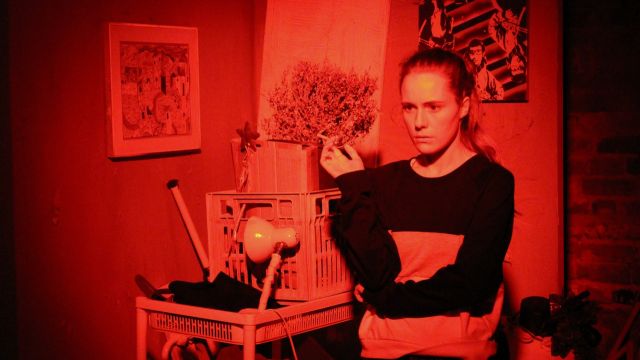Keep
The stage is piled high with tottering piles of junk – the kind of junk that would still be there when a jumble sale is over. A dead plant, fluorescent flower jewellery, ghastly ‘art’, lurid soft toys piled on a battered cabinet, a headless but pregnant mannequin, bags of who-knows-what. You know the place smells off. A peremptory knocking at the apartment door. Naomi (Jess Yates) appears like a creature from her lair. She delays – and would forever if possible – answering that knocking, even though – or because - it’s her sisters Kara (Christine Walls) and Jane (Angie Glavas) – unexpected and unwanted.
Grumpy, sloppily dressed Kara takes one look and is so disgusted she goes back outside for another cigarette. Jane – well groomed, well spoken - speaks ‘reasonably’ to Naomi as if from a great height. Kara and Jane have come to perform an ‘intervention’ on their hoarder sister. Just why they want to do this isn’t exactly clear. Are they threatened by their sister’s neurosis? Why don’t they mind their own business? If the motive is sisterly love or concern, it doesn’t get much of a look in.
Anyway, Kara and Jane want to clean all this shit out! It’s impossible, it’s wrong, it’s crazy, it’s all crap anyway. But Naomi clings even to the dead plant; she wants to keep everything, it’s hers. We assume the debris is a metaphor for Naomi’s emotional state – or that’s the playwright’s intention. (If so, the unnamed designer might have chosen the junk more carefully). All this junk is Naomi’s defence to keep the past at bay – but never to let go of it. The past in which a mysterious loss occurred – and to which each of the sisters has erected her own defence.
Thus begins another fraught, highly emotional tale from the US of sisters and their secrets and lies. With three characters - and later one more – Keep doesn’t have the focus or punch of Owl & Cat’s recent sisters show, The Violet Sisters, but, once we work out who’s who, the play’s strength is in the individuation of the sisters and their interactions. Kara is loud and irritable because she’s had no life – or ‘no childhood’ as she puts it. She became the responsible one when their mother died. Jane (somewhat irrelevantly but amusingly) is a lesbian in a relationship with a psychiatrist, whom she quotes. She has absented herself from this messy situation but believes it can all be fixed with soothing, therapeutic words. She’s wrong of course. Playwright Francesca Pazniokas doesn’t have a lot to say about Jane and when the play has dealt with what there is, Jane simply leaves the stage and lets the real antagonists, Naomi and Kara, get on with it.

When the fourth (dead) sister, Margo (Ruby Duncan) appears as a ghost, the play changes gear and style. Margo, we learn, stole a car and disappeared, leaving Naomi, in particular, betrayed and exposed. Really, the text would present any director with a near insurmountable problem: what to do with Margo once she’s on stage? Where do you put her? How should she be lit? If she’s a ghost… ? While director Khisraw Jones-Shukoor does a fine job up this point, things get awkward and just faintly risible as ghost-but-more-a-memory Margo – dressed like the others, makeup like the others, but visible only to Naomi – weaves around the small, junk laden stage, commenting on and correcting Kara and Naomi’s squabbles and addressing the audience rather than Naomi. Then the text present a lesser problem, but a problem none the less: a clunky device in which Naomi reveals postcards from Margo, written from all over America but previously unknown to Kara, and which Kara proceeds to read aloud. Perhaps defeated by this, Jones-Shukoor adds literal minded lighting cues. When a Margo postcard speaks of the red light somewhere, the stage lights go red, blue light becomes blue… Just why or how Margo died isn’t too clear, but it may have been obscured by the awkward staging.
I don’t think it’s too much of a spoiler to say that Naomi and Kara do hug, but we know – and it’s not unexpected - that nothing will change. Naomi has, of course, already read the postcards; she will go feeling betrayed by Margo and go on being a hoarder. Kara still won’t have had a childhood. Margo is dead. And Jane is already gone.
None of this is any reflection on the four cast. They are all very good and they do the absolute best they can with this problematic text. Ms Duncan’s thankless task as Margo aside, Ms Yates’ Naomi plays all the stubbornness of the weak girl very well. Christine Walls’ Kara hits the right note of the woman who acted correctly and is now resented for it. Lipstick lesbian Jane – Ms Glavas – enjoys the comedy of self-absorbed abstraction and so do we.
It’s Ms Pazniokas’ first play and I’m afraid the inexperience shows. In an online interview she confesses to getting overwhelmed by her emotions. What we are left with is four credible characters per se, but no very credible psychological basis for Naomi’s hoarding or anyone’s motivation for that matter. While appreciating the veracity of the performances, the play is a situation that leaves you with the dubious feeling of ‘what, really, was that all about?
Michael Brindley
Subscribe to our E-Newsletter, buy our latest print edition or find a Performing Arts book at Book Nook.

